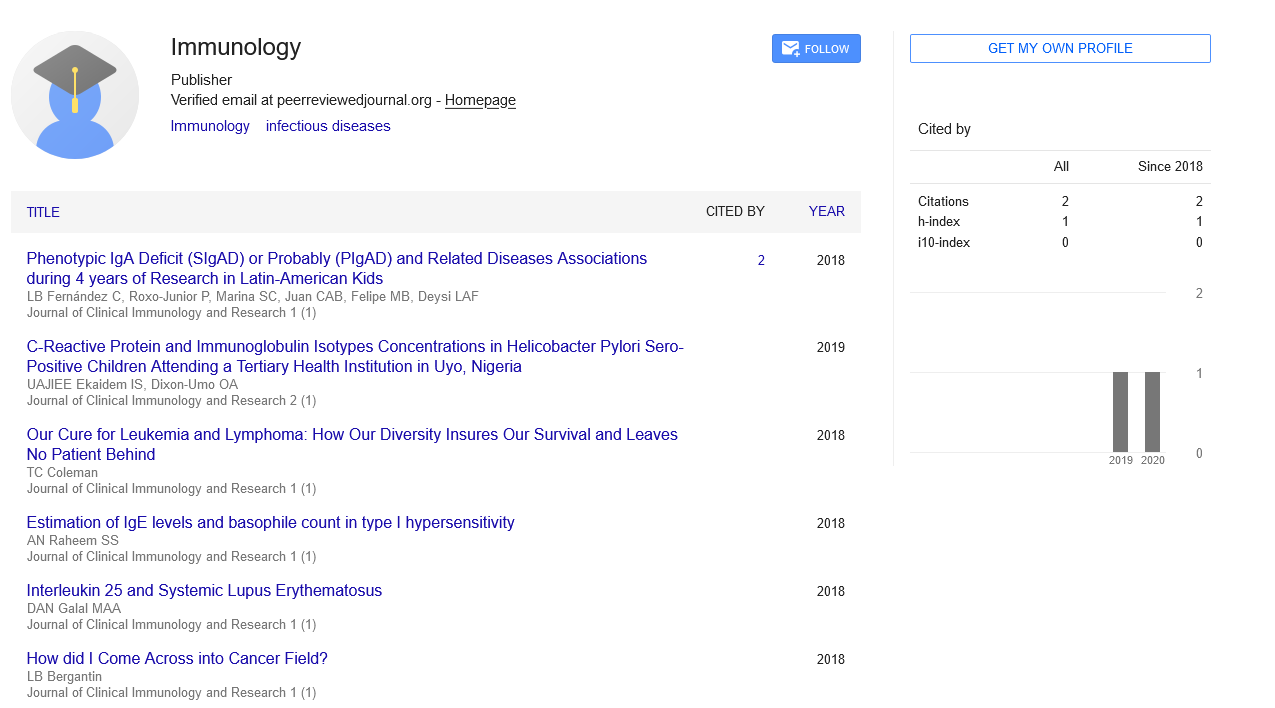Short Communication, J Clin Immunol Res Vol: 6 Issue: 1
Contemporary Advances in Tumor Immunology
Chen Shurui*
1Department of Oncology and Hematology, The Affiliated Hospital to Changchun University of Chinese Medicine, Changchun, China
*Corresponding Author: Chen Shurui
Department of Oncology and Hematology,
The Affiliated Hospital to Changchun University of Chinese Medicine, Changchun,
China
E-mail: chenshu3@sina.com
Received date: 19 March, 2023, Manuscript No. JCIR-23-99612;
Editor assigned date: 22 March, 2023, PreQC No. JCIR-23-99612 (PQ);
Reviewed date: 05 April, 2023, QC No. JCIR-23-99612;
Revised date: 12 April, 2023, Manuscript No. JCIR-23-99612 (R);
Published date: 19 April, 2023, DOI: 10.4172/JCIR.100065
Citation: Shurui C (2023) Contemporary Advances in Tumor Immunology. J Clin Immunol Res 6:1.
Description
Tumor immunology has witnessed significant advancements in recent years, offering new insights into the complex interplay between cancer and the immune system. The understanding of the tumor microenvironment, immune evasion mechanisms, and the role of immune cells in tumor development and progression has expanded.
Advances in tumor immunology
The tumor microenvironment plays a vital role in shaping the immune response against cancer. Recent studies have revealed the presence of various immune cells within the tumor, such as Tumor- Infiltrating Lymphocytes (TILs), Myeloid-Derived Suppressor Cells (MDSCs), and regulatory T cells (Tregs). The balance between effector and suppressor immune cells in the tumor microenvironment has a significant impact on tumor progression and response to therapy. Understanding the dynamic interactions and cellular components within the tumor immune microenvironment has opened avenues for targeted immunotherapeutic interventions [1].
Immune checkpoints are regulatory pathways that prevent excessive immune activation and maintain immune homeostasis. However, tumors exploit these pathways to evade immune surveillance. Immune checkpoint inhibitors, such as anti-CTLA-4 and anti-PD-1/PD-L1 antibodies, have revolutionized cancer treatment by blocking inhibitory signals and reinvigorating antitumor immune responses. These therapies have shown remarkable success in various malignancies, including melanoma, lung cancer, and bladder cancer. Ongoing research focuses on identifying novel immune checkpoints and developing combination therapies to further enhance response rates and overcome resistance [2,3].
Adoptive Cell Therapy (ACT) involves manipulating a patient's own immune cells to recognize and eliminate cancer cells. One of the most notable approaches is Chimeric Antigen Receptor (CAR) T-cell therapy, where T cells are genetically engineered to express CARs targeting specific tumor antigens. CAR-T cell therapy has achieved remarkable outcomes in hematological malignancies, such as acute lymphoblastic leukemia and non-Hodgkin lymphoma. Recent advancements aim to improve CAR-T cell persistence, enhance tumor targeting, and reduce toxicity, expanding the applicability of this therapy to solid tumors [4-6].
Personalized immunotherapy strategies are emerging as a promising direction in cancer treatment. These approaches aim to tailor immunotherapy based on individual patient characteristics, such as tumor genetic profiling, immune status, and immune cell repertoire. Personalized vaccines, neoantigen-targeted therapies, and immunebased combination therapies are being explored to optimize treatment outcomes and minimize adverse effects. The integration of genomic and immune profiling technologies has provided a foundation for precision immunotherapy, paving the way for more effective and individualized treatment strategies [7,8].
Overcoming challenges and future perspectives
While tumor immunotherapy has shown remarkable successes, challenges remain. Tumor heterogeneity, immune evasion mechanisms, and resistance to immunotherapy are areas of active investigation. Combination therapies, including immune checkpoint inhibitors with other treatment modalities such as chemotherapy and targeted therapy, are being explored to overcome resistance and improve response rates. Additionally, novel approaches such as oncolytic viruses, cancer vaccines, and immune agonists hold confidence in expanding the immunotherapeutic arsenal [9,10].
Conclusion
Contemporary advances in tumor immunology have transformed the landscape of cancer treatment. The elucidation of the tumor immune microenvironment, the development of immune checkpoint inhibitors, the rise of adoptive cell therapy, and the emergence of personalized immunotherapy approaches have revolutionized patient care. The ongoing analysis and clinical efforts in this study will aim to overcome challenges, improve response rates, and expand the application of immunotherapy to a wider range of cancer types.
References
- Bonilla FA, Bernstein, IL, Khan DA, Ballas ZK, Chinen J, et al. (2005) Practice parameter for the diagnosis and management of primary immunodeficiency. Ann Allergy Asthma Immunol 94:S1-S63.
- Bousfiha A, Jeddane L, Al-Herz W, Ailal L, Casanova JL, et al. (2015) The 2015 iuis phenotypic classification for primary immunodeficiencies. J Clin Immunol 132: 78-92.
- Modell V, Quinn J, Orange J, Notarangelo LD, Modell F (2016) Primary immunodeficiency is worldwide: an updated overview from the Jeffrey Modell centers global network. Immunol Res 64:736-753.
- Yazdani R, Latif A, Tabassomi F, Abolhassani H, Azizi G, et al. (2015) Clinical phenotype classification for selective immunoglobulin a deficiency. Expert Rev Clin Immunol 11:1245-1254.
- Picard C, Al-Herz W, Bousfiha A, Casanova JL, Chatila T, et al. (2015) Primary immunodeficiency diseases: an update on the classification from the international union of immunological societies expert committee for primary immunodeficiency 2015. J Clin Immunol 35:696-726.
- Naylor S (2008) Biomarkers: Current perspectives and future prospects. Expert Rev Mol Diagn 3:525-529.
- Marín JAM, Martínez JG, Chavarría BHG, Allen JLF, Anduiza CIA, et al. (2009) Correlation between HIV viral load and aminotransferases as liver damage markers in HIV infected naive patients: a concordance cross-sectional study. Virol J 6:1-4.
- Kourtis AP, Bulterys M, Hu DJ, Jamieson DJ (2012) HIV-HBV Coinfection: A Global Challenge. N Engl J Med 366:1749-1752.
- Wondimeneh Y, Alem M , Asfaw F, Belyhun Y (2013) HBV and H C V seroprevalence and their correlation with CD4 cells and liver enzymes among HIV positive individuals at University of Gondar Teaching Hospital, Northwest Ethiopia. Virol J 10:171.
- Ekouevi DK, Tchounga BK, Coffie PA, Tegbe J, Anderson AM, et al. (2014) Antiretroviral therapy response among HIV-2 infected patients: A systematic review. BMC Infect Dis 14:461
 Spanish
Spanish  Chinese
Chinese  Russian
Russian  German
German  French
French  Japanese
Japanese  Portuguese
Portuguese  Hindi
Hindi 